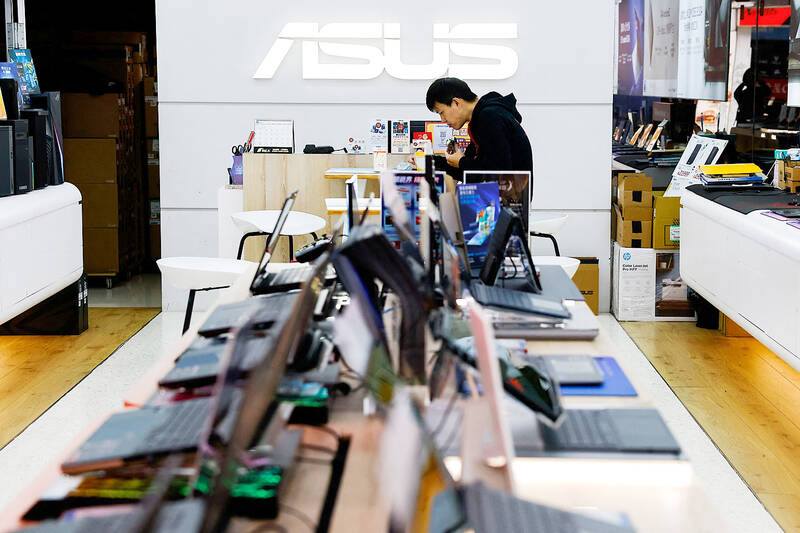Asustek Computer Inc (華碩), the world’s No. 5 PC vendor, has prebuilt inventory as part of its efforts to avert cost increases stemming from hefty “reciprocal” tariffs slapped by the US on Asian countries, which house a majority of the world’s PC manufacturing factories.
US President Donald Trump imposed a tariff of 32 percent on imports from Taiwan, 34 percent on China and 46 percent on Vietnam among numerous countries around the world, which took effect yesterday.
Trump on Tuesday increased the punitive tariff on Chinese goods to 104 percent.

Photo: Ann Wang, Reuters
“Asustek is closely monitoring the changes in policy and tariff system to flexibly adjust its inventory management policy, supply chain allocations and pricing strategy,” the company said in a statement on Tuesday, adding that it has strategically prebuilt extra inventories as part of its contingency plans.
In a precautionary move, Asustek boosted stocks at its US hubs during the fourth quarter of last year, the company said.
The US market accounted for 13 to 15 percent of the company’s total revenue last year, while Asia made up 47 percent and Europe 29 percent, the company said.
Asustek outsources most of its own-brand computer production to electronics manufacturing service providers and sources components from a variety of suppliers.
As such arrangements would lead to increases in manufacturing costs, the company might have to pass on the cost increases to end customers, it said.
PC vendor Acer Inc (宏碁) said in February it would raise computer retail prices by 10 percent, as tariff hikes would drive up costs.
Separately, Asustek yesterday reported revenue of NT$64.3 billion (US$1.95 billion) for last month, up 29 percent from NT$49.73 billion a year earlier and marking its best March revenue ever.
Revenue in the first quarter surged 21.36 percent to NT$147.7 billion from NT$121.7 billion the year before, also the best first-quarter performance in the company’s history, Asustek said.

TAKING STOCK: A Taiwanese cookware firm in Vietnam urged customers to assess inventory or place orders early so shipments can reach the US while tariffs are paused Taiwanese businesses in Vietnam are exploring alternatives after the White House imposed a 46 percent import duty on Vietnamese goods, following US President Donald Trump’s announcement of “reciprocal” tariffs on the US’ trading partners. Lo Shih-liang (羅世良), chairman of Brico Industry Co (裕茂工業), a Taiwanese company that manufactures cast iron cookware and stove components in Vietnam, said that more than 40 percent of his business was tied to the US market, describing the constant US policy shifts as an emotional roller coaster. “I work during the day and stay up all night watching the news. I’ve been following US news until 3am

Six years ago, LVMH’s billionaire CEO Bernard Arnault and US President Donald Trump cut the blue ribbon on a factory in rural Texas that would make designer handbags for Louis Vuitton, one of the world’s best-known luxury brands. However, since the high-profile opening, the factory has faced a host of problems limiting production, 11 former Louis Vuitton employees said. The site has consistently ranked among the worst-performing for Louis Vuitton globally, “significantly” underperforming other facilities, said three former Louis Vuitton workers and a senior industry source, who cited internal rankings shared with staff. The plant’s problems — which have not

UNCERTAINTY: Innolux activated a stringent supply chain management mechanism, as it did during the COVID-19 pandemic, to ensure optimal inventory levels for customers Flat-panel display makers AUO Corp (友達) and Innolux Corp (群創) yesterday said that about 12 to 20 percent of their display business is at risk of potential US tariffs and that they would relocate production or shipment destinations to mitigate the levies’ effects. US tariffs would have a direct impact of US$200 million on AUO’s revenue, company chairman Paul Peng (彭雙浪) told reporters on the sidelines of the Touch Taiwan trade show in Taipei yesterday. That would make up about 12 percent of the company’s overall revenue. To cope with the tariff uncertainty, AUO plans to allocate its production to manufacturing facilities in

TARIFF CONCERNS: The chipmaker cited global uncertainty from US tariffs and a weakening economic outlook, but said its Singapore expansion remains on track Vanguard International Semiconductor Corp (世界先進), a foundry service provider specializing in producing power management and display driver chips, yesterday withdrew its full-year revenue projection of moderate growth for this year, as escalating US tariff tensions raised uncertainty and concern about a potential economic recession. The Hsinchu-based chipmaker in February said revenues this year would grow mildly from last year based on improving supply chain inventory levels and market demand. At the time, it also anticipated gradual quarter revenue growth. However, the US’ sweeping tariff policy has upended the industry’s supply chains and weakened economic prospects for the world economy, it said. “Now